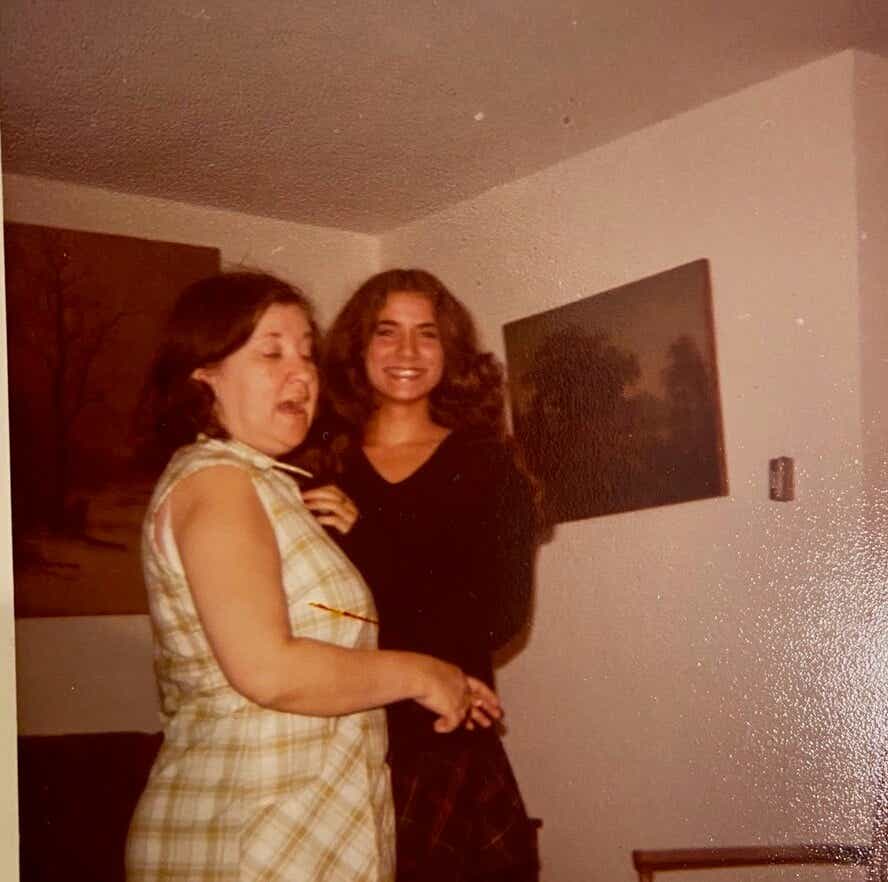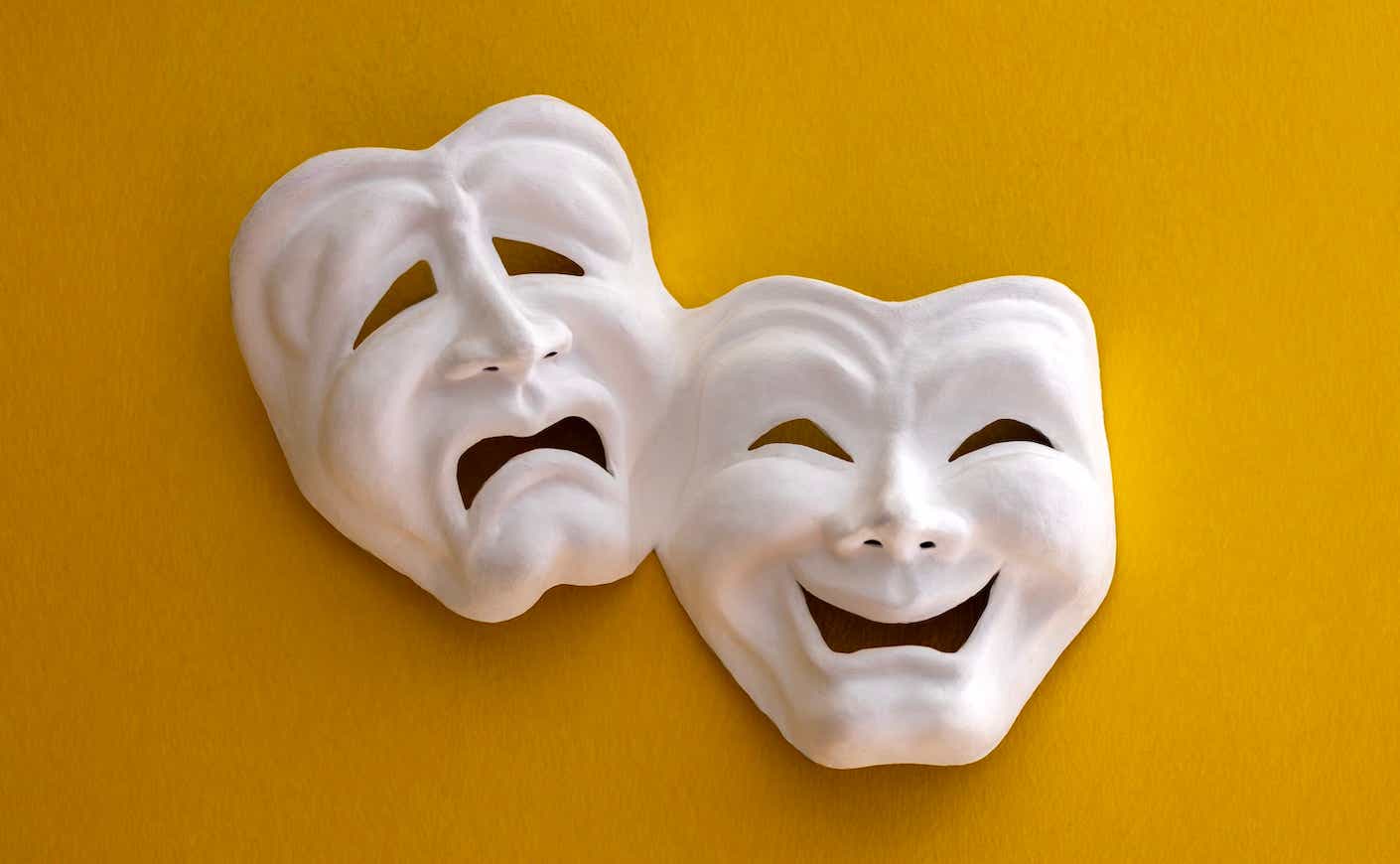I learned to be funny because my mother was chronically depressed.
From infancy onward — through a mixture of survival instinct, emotional alchemy, and a craving for approval — my role was to transform my mother’s moments of despair into narratives of triumph and adventure, and, trickiest of all, create a way for both of us to laugh rather than weep once the tale was done.
My first memory of using humor as a survival skill is when my mother was trying to teach me how to tie my shoelaces. I remember us both being on the verge of tears in frustration; dexterous, I have never been. Instead of turning inward, I worried that my mother would become overwhelmed and upset, give up on me and the task, and start crying — a spiral I’d become familiar with. I knew it was essential for me to change the mood and make her laugh if I ever wanted to learn to tie my shoes or simply avoid a parental meltdown in this moment. So I started theatrically overdoing the number of loops. Even though I still couldn’t get the knots secure, we avoided collision.
The intricacies and pressure of parenting seemed to have a menacing effect on my mother.
“If I had another child, maybe she would have looked like me,” she would say, taking a long drag on her Newport and eyeing my seven-year-old self as if I’d been an unwise impulse purchase, gum grabbed at the check-out that turned out to be wintergreen rather than peppermint and not to her taste.
She would have been about 38 around then, her fine blonde hair fading to brown and her cat-green eyes clouded with smoke. In my reply, I’d skip over the fact that I looked like my father, with his black hair and dark Sicilian eyes. Weren’t girls supposed to be little versions of their moms, cut from the same genetic and gendered cloth? Shouldn’t I have resembled her, a fair-skinned, French-looking Quebecois, bow-mouthed, and cuter than a Coney Island Kewpie Doll?
Wasn’t I supposed to be a better, newer edition of her? A do-over, a justification for the fact that she left her family, country, and language behind to follow her foreign love to Brooklyn, New York?
“Well, if I had another mother, I guess I would have looked like her,” was my reply. It could have been dangerous, getting close to the actual topic of her ambivalence about motherhood.
“How’d you get so smart?” she’d smile, and puff at the cigarette. I’d pretend grown-up seriousness and shrug, “It comes with the curly hair,” I’d say. Then she would laugh.
My mother had a terrific laugh, making it even more tempting to entertain her. She also had a combination of what would now be diagnosed as PTSD, bipolar II disorder, and agoraphobia.
My mother had grown up in poverty, been sexually abused as a pre-pubescent girl by two maternal uncles (which her own mother dismissed as ordinary playfulness). Her chaotic upbringing filled her with shame, as even loving attachments became disguised and distorted.
It was tough to be her, I’ve realized in retrospect. And as a result, I can now understand with compassion for myself that it was also hard to be her kid.
Becoming the adult in the relationship, taking sensitive emotional care of the caretaker, is what children of parents with mental health issues often do.
When a child learns to imagine how a parent will react to the world rather than experiencing it themselves, with their reactions filtered by an anxious sensitivity toward a vulnerable adult, that child is no longer a child. Becoming the adult in the relationship, taking sensitive emotional care of the caretaker, is what children of parents with mental health issues often do. It’s what I did from childhood through adolescence.
I wouldn’t wake her if I had a nightmare; I knew she was an uneasy sleeper and needed rest. If she and father weren’t speaking, I’d listen to her stories about their troubled relationship and nod as she offered details concerning repeated patterns of his infidelity. I would smooth her hair and stir sugar into her tea.
Living her life as if she had packed her suitcases for an early departure from a rented room, I was not surprised when she was diagnosed with cancer. Neither was she: Her own mother and several of her aunts had died of various kinds of cancer before they could turn 50. But even before that diagnosis, she always felt it was her destiny to leave as soon as I was old enough to be left. “I will never have to worry about getting old,” she’d sigh in a voice like Bette Davis.
She died at 47 of bone cancer, but her depression had been chipping away at her for years.
Only when a parent can trust a child does the child learn to trust herself.
While I was not directly blamed for my mother’s depression, I always felt collaborative in the cause of it. When she became pregnant with me, my father was unfaithful to her. Only when a parent can trust a child does the child learn to trust herself, and since my presence coincided with a fracture in their marriage even before I was born, I could not be trusted.
Of course, neither my father nor I was responsible for my mother’s fragile mental health. But since discussing private psychological vulnerabilities would have been even more taboo than naming forbidden body parts, our family disguised and distorted real emotions by allotting them false attributions. In marrying her, my father was supposed to have rescued her from a sad life, not make her only sadder. When he failed, the children were surely meant to compensate.
Children were expected to bring their mothers an unadulterated loyalty and happiness that the mothers couldn’t find anywhere, or in anyone, else. I couldn’t resemble my mother or speak her language, but I could make her laugh. I was, therefore, trusted to, at the very least, make a sincere effort to divert attention, turn the straw of a bad day into the gold of a funny story, and lighten a dark moment by juggling some of the weight and pretending it was nothing serious.

But when I couldn’t always rise to the occasion (because no human being, let alone a child, is capable of such a feat), I felt dismissed as a would-be who failed the audition.
Years of therapy, the right medications, and facing my own issues surrounding anxiety, depression, and loss have afforded me a strength upheld by a successful professional life, a healthy long-term marriage, solid friendships, and forms of independence unimaginable to my mother.
Unlike my mother, I acknowledge that I inherited a batch of mental health puzzles I’ll need to work on for the rest of my life. Assigning blame is unimportant. Understanding that generations of women in my maternal line suffered from mental health issues helps provide me with a context for understanding my fears, hesitations, worries, and need to prove myself on a constant basis, no matter how successful I seem to others. And that part is important.
With her eighth-grade education, her emotional scars, and her impecunious circumstances, my mother never developed a community of friends and caregivers to offer her support and encouragement. From seeing what she didn’t have, I learned what I needed, and what I could give to others: the privileges of community, support without hesitation or embarrassment, a place to laugh as well as a place to weep. My mother, and millions of other women, didn’t know such tender humilities and fierce camaraderies were possible. Part of my job as a writer and humorist is to open those trapdoors, backdoors, cellar doors, and let in the light.
And so, while I no longer believe my mother was making me audition, I continue to perform when I write columns, articles, and books; give classes, talks, or workshops; or speak to people at the check-out line who seem to need cheering. Humor leaps across space, like electricity, and connects us. My mother taught me this.
Gina Barreca, Ph.D., Board of Trustees Distinguished Professor at the University of Connecticut, author of the newly released Gina School and nine other books, including the bestselling THEY USED TO CALL ME SNOW WHITE BUT I DRIFTED: Women’s Strategic Use of Humor, uses humor to address complex subjects. You can find her at ginabarreca.com and on Instagram.













